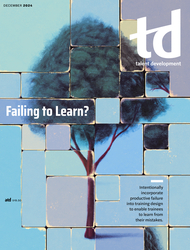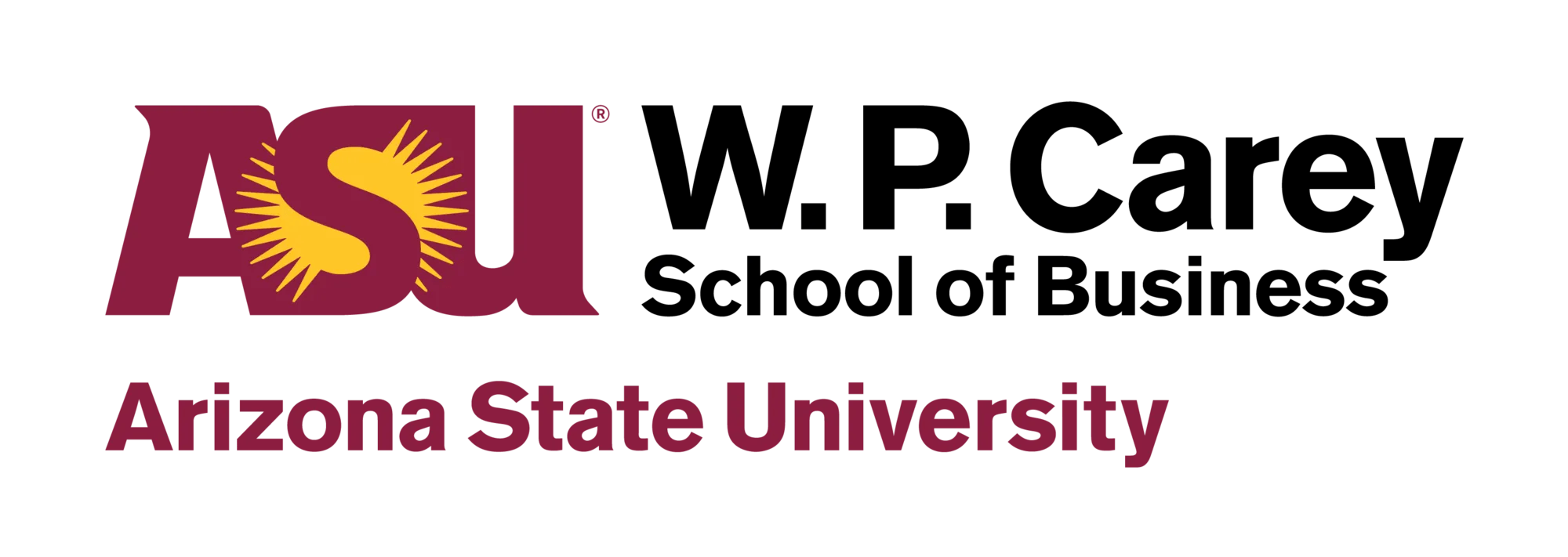TD Magazine Article
Higher Education, December 2024
Higher education institutions offer a range of options that contribute to upskilling the workforce.
Published Mon Dec 02 2024
Whether it's for your own professional development or the development of employees in your organization, higher education institutions offer a range of options that contribute to upskilling the workforce. Considering many employers offer tuition reimbursement for education, higher education can be a viable route for career development. The higher education institutions on the following pages offer their insights.
Talent development professionals focus on improving the performance of an organization's employees. But who develops the developer? There are many ways to do so, including higher education. The focus here is a specific degree: the professional doctorate, and why you should consider earning one.
Getting a doctorate is a different experience. It includes conducting significant, relevant research in the field. The professional doctorate is different from the more traditional "scholarly" doctorate in an important way: Instead of working with theory, you advance practice.
There are two big reasons for talent development practitioners to pursue a professional doctorate. At the professional level, your contributions to practice will advance the field of talent development. Personally, the knowledge, skills, and abilities you develop will place you at the very pinnacle of the field. Also, the credential can advance your career.
Earning a professional doctorate is hard: two or more years learning research skills and the key aspects of the talent development profession, followed by a year or more of applied research, making a significant and practical contribution to the field. But for those who accomplish it, the results can be rewarding for your career and for all of us in talent development.
humancapitallab.org
Pei-yu (Sharon) Chen, who leads the Information Systems Department at the W.P. Carey School of Business at Arizona State University, combines a deep passion for technology with a commitment to societal benefits. Her interest first ignited during college with her first computer and the early days of the internet, setting her on a path of digital evolution. "From the rise of Amazon and Netflix to the advent of e-commerce, smart devices and now GenAI, technology has continually reshaped our society," Chen recalls. "It's this constant evolution that keeps me passionate and excited about my work every day."
The department champions a broad scope of activities, focusing on the application of data and technologies to improve organizational functions and societal welfare. Under Chen's leadership, the department offers high-caliber programs in information systems, artificial intelligence, and business analytics. Those programs seamlessly integrate advanced technology with practical business applications and cater to both degree-seeking students and professionals aiming to upskill. "Our aim is not only to explore techno logical capabilities but also to ensure that these advancements enhance human lives," Chen states.
"Our approach to education is not just about technological proficiency; it's also deeply rooted in what we call Mindful AI.' This concept aligns with ASU's inspiration on Principled Innovation innovating with a clear, beneficial purpose in mind. Through Mindful AI, we ensure that our teaching not only covers AI's functionalities but also instills a principled approach to innovation. This methodology equips current professionals to thrive in and ethically shape the evolving AI-enhanced landscape."
As the new economy becomes increasingly driven by AI, the need to upskill and reskill the workforce becomes imperative. For talent development professionals, that shift represents both a challenge and an opportunity. The future workforce will be fluent in AI and analytics and grounded in ethical judgment. The incoming talent from programs like ASU's will be well-prepared to disrupt traditional business practices, demanding that current systems adapt to fully harness their potential. Talent development leaders must focus on creating environments that not only leverage this new wave of expertise but also foster continuous innovation and ethical reasoning. Preparing for this integration will involve rethinking existing frameworks and developing new strategies that enable these adept, principled newcomers to thrive and drive change.
At ASU, Chen and her department are crafting a narrative that places equal importance on technological prowess and ethical considerations. That approach is preparing a new generation of professionals to use AI and digital innovations to foster genuine societal advancement. The blend of high-tech education and humanistic values positions the W.P. Carey School of Business as a beacon of balanced and impactful tech education, instilling confidence in students and the industry at large.
wpcarey.asu.edu/executive-education
In today's fast-paced, constantly evolving workplace, organizations face the ongoing challenge of attracting top talent while developing and retaining that talent for long-term success. By investing in training and development, organizations can create an environment where individuals thrive, collaborate effectively, and contribute to achieving the company's goals. The ability to foster an engaged workforce can make the difference between a high-performing workforce and one that struggles to stay involved.
According to Gallup, 42 percent of employees who leave say their manager or organization could have done something to prevent their departure. That highlights the impact managers have on employee retention. However, many managers struggle to make their interactions with employees meaningful, often perceived as micromanagement. Even well-intentioned actions can backfire, frustrating employees. Being equipped with the right skills to do so effectively highlights the importance of training and development.
Success in this people-development business requires a well-rounded skill set that includes leadership theory, coaching, change management, and an understanding of adult learning principles. Those skills enable employees, managers, and leaders alike to build strong working relationships, navigate challenges, and guide their organizations through transitions. Coaching empowers employees by fostering problem-solving abilities and decision-making autonomy, ultimately boosting their confidence. Change management helps guide teams through organizational shifts, while adult learning principles ensure that training and development programs resonate with employees, leading to meaningful and lasting growth.
So, the critical question is: Are your skills ready to take you to the next level?
Continuing your education is one of the best ways to develop these essential skills. Many companies recognize the value of education and offer tuition reimbursement programs, helping employees cover the cost of courses while balancing their work and personal responsibilities. Taking advantage of those benefits enhances your professional growth and strengthens your contribution to your company. It's a journey of growth and self-improvement that can inspire and motivate you.
For working professionals, selecting an educational program that provides flexibility is crucial. Online asynchronous courses present an excellent choice, enabling you to enroll in one or two classes each semester while balancing other responsibilities. Flexible programs with strong faculty support and real-time, workplace-related projects can further enhance the learning experience, ensuring that you can immediately apply to your job the skills you acquire.
Another option is to explore university-sanctioned certificate programs, which offer focused coursework to build expertise in specific areas while you earn university credit. Choosing programs that offer tuition at an in-state rate regardless of where you live for the asynchronous classes can also help you avoid unnecessary financial burdens. By selecting a flexible education program tailored for working professionals, you can equip yourself with the skills necessary to succeed in today's complex, ever-evolving workplace. Whether you want to lead, collaborate, or drive success, the right education can prepare you to excel in your career.
isu.edu/olp
When Herb Kelleher and Rollin King founded Southwest Airlines in 1966, they faced significant headwinds. Before they could open for business, competitors took legal action to keep them grounded.
Fortunately, Kelleher was also a lawyer.
After settling the lawsuits in 1970, Southwest began operations with three Boeing 737 planes.
Under Kelleher's leadership, Southwest grew to become one of the most successful airlines in the US. But the key to that success wasn't just streamlined operations and affordable airfare. Southwest Airlines' biggest success was creating a compassionate, inclusive culture that valued employees.
Leading With Support for Individuals
Transformational leaders understand that organizations can only grow sustainably when their team members grow.
As Bill Taylor explains, 1 "Kelleher and his colleagues identified the ‘Eight Freedoms' that defined life inside [the] airline, from ‘the freedom to learn and grow' to ‘the freedom to create financial security' to ‘the freedom to create and innovate.' Kelleher understood … that your brand is the outward expression of your culture, and that your culture is the only platform that can sustain and renew your brand."
The Society for Human Resource Management defines engagement as "the level of an employee's commitment and connection to an organization." 2 Put simply, engaged employees believe their work has purpose and remain motivated to do the job well and provide a better customer experience.
As the people within your organization grow their knowledge and expertise, they become more engaged and the organization grows.
Leading With Shared Vision and Purpose
Transformational leaders seek out input from all levels to identify shared purpose, thus collaborating to develop an aspirational vision that serves employees as much as it serves customers and shareholders.
"The business of business is people," Kelleher once said. 3 "Among employees, shareholders, and customers, we decided that our internal customers—our employees—came first. The synergy, in our opinion, is simple: Honor, respect, care for, protect, and reward your employees, regardless of title or position. And in turn they will treat each other and their external customers in a warm, caring, and hospitable way. This causes external customers to return, thus bringing joy to shareholders."
Such work requires intentional organizational learning and change management.
Leading by Example
Great leaders build relationships, understand people's individual strengths, listen to constructive criticism, and take action to enable organizational change.
Perhaps most importantly, they lead by example.
Despite his eccentricities, Kelleher didn't just talk the talk. He delivered on his promise to build a company with heart (and not just a heart logo). He strove to be a transformational leader and to inspire others to do the same.
Continue Learning
As workplaces become increasingly complex, the ability to foster growth and drive meaningful change within an organization has never been more valuable. If you'd like to learn more about transformational leadership, consider enrolling in CSU's online MEd in Education and Human Resource Studies with a specialization in Organizational Learning, Performance, and Change.
online.colostate.edu/degrees/olpc
As industries face increasing disruption from technological advancements, the role of higher education in shaping leadership and workforce development is more critical than ever. Generic professional development programs no longer suffice in keeping organizations competitive. Today's corporate landscape demands tailored learning experiences that directly address the specific challenges and skills required at every level. Higher education institutions possess the scale and expertise to cascade learning throughout an organization, creating a lasting impact.
Companies have long turned to higher education for executive and leadership development, but a shift is occurring. Businesses now need bespoke learning solutions aligned with their strategic goals. Whether preparing leaders for digital transformation or training engineers in advanced technologies, the focus is on customization and real-world application.
Tailoring Learning to Organizational Needs
At the core of this shift is recognizing that one-size-fits-all programs no longer work. Businesses seek educational partners to design programs tailored to their specific needs. Those customized programs build competencies that are immediately applicable in the workplace. Such alignment between academia and corporate training is a game changer for industries needing to stay ahead.
For example, a large technology company facing a talent gap collaborated with a university to design a certificate program that blends advanced engineering principles with leadership skills. The result? Leaders equipped to manage large teams and solve real-world challenges. That type of customized learning ensures leadership development is hands-on and directly tied to organizational goals.
A Scalable Approach to Lifelong Learning
Higher education also brings scale to professional development. While individual coaching and in-house training have value, they often struggle to reach multiple levels of an organization. Universities, on the other hand, can leverage their infrastructure to offer scalable solutions that meet the needs of different leadership levels, from managers to senior executives. The scalability enables organizations to cascade learning initiatives across departments, ensuring a unified approach to leadership and skills development.
Consider a global energy company that needed to upskill its workforce in advanced data analytics. Working with a university partner, the company implemented a tiered learning program. Entry-level employees received foundational training, while senior staff participated in an advanced track focused on applying analytics to strategic decision making. The approach not only improved technical skills across the organization but also fostered a culture of continuous learning.
The Competitive Edge of Customization
In the years ahead, companies that invest in tailored, scalable programs will gain a competitive advantage. They'll be better equipped to handle today's fast-paced environment because their workforce will have the skills to innovate, adapt, and lead. Higher education's combination of academic rigor and real-world flexibility makes it the ideal partner for organizations looking to future-proof their workforce.
As the demand for specialized skills grows, the partnership between universities and businesses will deepen. Together, they will ensure that learning becomes a strategic tool driving long-term success.
ctme.caltech.edu
Long-term satisfaction with work goes beyond the day-to-day enjoyment of the activities and is focused on whether the results of the work add up to something meaningful. That meaning reflects the alignment between the product of the work and a person's values.
Research on values by Shalom Schwartz and colleagues suggests that there is a universal set of values that reflects two dimensions: whether people value individual benefits or societal benefits and whether they value growth or safety. Different career paths highlight different combinations of those dimensions. As examples, a career that provides a trajectory with opportunities for recognition reflects both growth and personal benefit, while a career that supports cultural traditions reflects safety and societal benefit.
Everyone cares about having a career that aligns with their values to some degree, but in the past this was most important to people who were later in their careers than those at the start of their journey. As Dr. Art Markman notes, "Historically, people who were in an early-career phase needed to ensure their financial stability and to find a path toward career success, so the overall contribution was less important than the immediate benefits of the job." Only later in a careers did people start thinking about their legacy and focusing more strongly on the connection between career and values. That is one reason people at midlife who have experienced a personal tragedy often re-evaluate their career choices and make a change.
In general, there aren't strong generational differences among people in the workplace. But the rising generation entering the workforce does seem to be more concerned about the fit between career and values at an earlier age than has been evident in the past.
That difference probably reflects two factors about the rising generation.
First, there has been a long-term erosion in the relationship between people and their employers. Because young people do not trust employers to nurture them and their careers, there is little expectation that their first employers will provide them with training and a grounding for later career success. As a result, young people in the workplace would like to see more fit between their values and their work from early on.
In addition, the rising generation came of age during the COVID-19 pandemic. The pandemic served as a global personal tragedy that led everyone to rethink the importance of their work. In general, tragedies—such as an illness, accident, or death in the family—strike different people at random times. The pandemic happened to everyone at the same time. Indeed, the Great Resignation, in which large a number of people changed jobs during the pandemic, was partly a reflection of many people undergoing a personal reckoning at the same time. That COVID-induced reckoning continues to influence the rising generation.
As a result, employers would be well-served to understand the values that their companies promote and to highlight them to prospective entry-level employees. In that way, companies may develop a closer bond with their youngest team members.
extendedcampus.utexas.edu/custom-training
You've Reached ATD Member-only Content
Become an ATD member to continue
Already a member?Sign In







